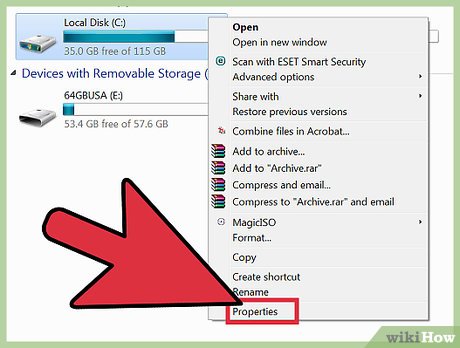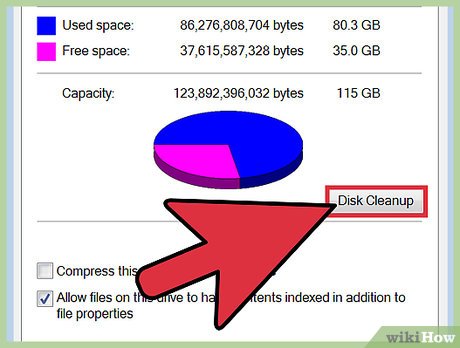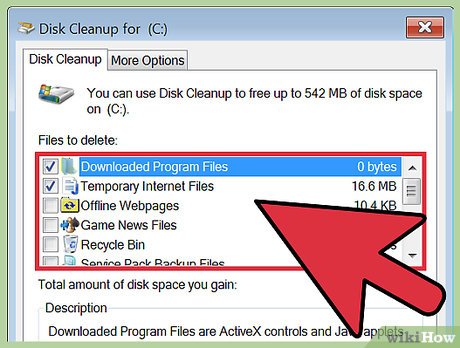How to Clear up Unnecessary Files on Your PC
Method 1 of 3:
Cleaning Your Disk
-
 Open "My Computer." Right-click on the drive that you want to clean and select "Properties" at the bottom of the menu.
Open "My Computer." Right-click on the drive that you want to clean and select "Properties" at the bottom of the menu. -
 Select "Disk Cleanup." This can be found in the "Disk Properties Menu." Disk Cleanup is a built in feature of Windows that allows you to delete unnecessary files from your PC.
Select "Disk Cleanup." This can be found in the "Disk Properties Menu." Disk Cleanup is a built in feature of Windows that allows you to delete unnecessary files from your PC. -
 Identify the files you wish to delete. You will most likely want to delete things like temporary files, log files, files in your recycle bin, and other unimportant files and you can do this by ticking the box next to its name.[1]
Identify the files you wish to delete. You will most likely want to delete things like temporary files, log files, files in your recycle bin, and other unimportant files and you can do this by ticking the box next to its name.[1] -
 Delete unnecessary files. Once you have selected the files you wish to delete, select "Ok." This may prompt a window to appear that will confirm your actions. Click "Yes."
Delete unnecessary files. Once you have selected the files you wish to delete, select "Ok." This may prompt a window to appear that will confirm your actions. Click "Yes."- There may be system files that you want to delete but they do not appear in the Disk Cleanup Menu. To access them, go to "Cleanup System Files" at the bottom of the Disk Cleanup window.
-
 Go to "More Options." Once the More Options Tab appears, look under the section entitled "System Restore and Shadow Copies" and select "Clean Up." This may take a few minutes to complete.
Go to "More Options." Once the More Options Tab appears, look under the section entitled "System Restore and Shadow Copies" and select "Clean Up." This may take a few minutes to complete. -
 Finish Up. Now that you have deleted unnecessary or temporary files on your computer, your PC should should run faster and smoother. You can determine how much space you have freed up on your hard drive by going to Computer and then selecting your hard drive. The amount of space you have will be in the bottom of the window.
Finish Up. Now that you have deleted unnecessary or temporary files on your computer, your PC should should run faster and smoother. You can determine how much space you have freed up on your hard drive by going to Computer and then selecting your hard drive. The amount of space you have will be in the bottom of the window.
Method 2 of 3:
Deleting Temporary Internet Files
-
 Go to "Internet Options." This can be found by selecting the Start Icon, then "Control Panel," and then selecting "Network and Internet." In this method, you will be deleting temporary internet files, which accumulate when you visit certain websites. They serve as your browser's cache and save pages and content like videos and music so that the next time you visit that site it will load faster.
Go to "Internet Options." This can be found by selecting the Start Icon, then "Control Panel," and then selecting "Network and Internet." In this method, you will be deleting temporary internet files, which accumulate when you visit certain websites. They serve as your browser's cache and save pages and content like videos and music so that the next time you visit that site it will load faster. -
 Select the "General Tab." Under Browsing History, select "Delete." This will prompt a window that will ask you to confirm that you wish to delete these files. Select "Delete All" and then "Yes."[2]
Select the "General Tab." Under Browsing History, select "Delete." This will prompt a window that will ask you to confirm that you wish to delete these files. Select "Delete All" and then "Yes."[2] -
 Click "Ok." This will delete all of the Temporary Internet Files folder on your computer in order to free up space on your disk.
Click "Ok." This will delete all of the Temporary Internet Files folder on your computer in order to free up space on your disk. -
 Finish up. Once you have done this, exit out of the program and determine the amount of space you have freed up on your hard drive. You can do this by going to Computer and then clicking on your hard drive. The amount of space you have will be in the bottom of the window.
Finish up. Once you have done this, exit out of the program and determine the amount of space you have freed up on your hard drive. You can do this by going to Computer and then clicking on your hard drive. The amount of space you have will be in the bottom of the window.
Method 3 of 3:
Deleting Duplicate Files
-
 Choose a duplicate finding application. There are a number of applications out there that find and delete duplicate files on your hard drive in order to free up space. Some of the more popular options are dupeGuru, VisiPics, Duplicate File Finder, and DigitalVolcano's Duplicate Cleaner Free.[3]
Choose a duplicate finding application. There are a number of applications out there that find and delete duplicate files on your hard drive in order to free up space. Some of the more popular options are dupeGuru, VisiPics, Duplicate File Finder, and DigitalVolcano's Duplicate Cleaner Free.[3] -
 Open the application. This will present you with a window where you can input files and folders that you wish to be scanned. After you have entered a few files, select "Scan."
Open the application. This will present you with a window where you can input files and folders that you wish to be scanned. After you have entered a few files, select "Scan." -
 Delete duplicate files. Once the program has scanned the selected files, it will show you where there are duplicates. Delete them by simply selecting and then pressing "Delete."[4]
Delete duplicate files. Once the program has scanned the selected files, it will show you where there are duplicates. Delete them by simply selecting and then pressing "Delete."[4] -
 Finish up. Once you have scanned your desired folders, exit out of the program and determine the amount of space you have freed up on your hard drive. You may want to scan two to three folders before checking the amount of space you have freed up. You can do this by going to Computer and then clicking on your hard drive. The amount of space you have will be in the bottom of the window.
Finish up. Once you have scanned your desired folders, exit out of the program and determine the amount of space you have freed up on your hard drive. You may want to scan two to three folders before checking the amount of space you have freed up. You can do this by going to Computer and then clicking on your hard drive. The amount of space you have will be in the bottom of the window.
Share by
Lesley Montoya
Update 05 March 2020
You should read it
- ★ Automatically delete temporary files every time a Windows 10 computer is opened
- ★ Delete the most 'stubborn' files on Windows
- ★ How to Delete Temporary Files and Delete Prefetch Files from Your Computer
- ★ Free up space on Windows 10 by deleting temporary files
- ★ Trick to delete junk files to free up space and cache iPhone, iPad













